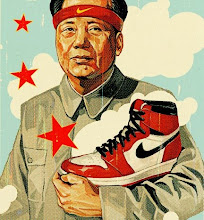The UFC might have just found their Yao Ming.
Since entering the Chinese market in 2009 with its initial broadcasting deal, the UFC has found the Chinese market tricky but full of potential in its future plans.
About a week ago when looking through my google news feed, I saw that a Chinese guy had just won a quick victory in the UFC. (video) Since then there has been an increasing amount of coverage in online and tv media on the "Mongolian Wolf," Tie Quan Zhang. The idea of a rugged Chinese guy beating up on the best fighters in the world really makes for good TV in China (just watch the movie 叶问2 that recently came out). He really might have the potential to be that spark that blows up the China market for the UFC.
Chinese people love their heroes and winners. In a country that only really cares about gold medals and being number 1 (theres even a mineral water brand thats the Chinese pronunciation of the English, "number one"), anyone who has the potential to be among the best in the world stage is quickly embraced and looked up to.
Yao Ming is famous by competing with Shaq in the NBA, Liu Xiang won the 1st gold medal for men in Olympic track & field, and Li-Ning built an entire global brand around his gymnastics exploits. Although Li Na and Zheng Jie are building the reputation for women's tennis, China really loves its male heroes. Thats the only explanation for the Chinese men's soccer team getting soo much funding.
Not only can the Mongolian Wolf grow the UFC market access in China, his future potential for stardom and fame is greater than both Yao Ming and Liu Xiang. If he dominates in the ring in hand to hand combat, it will outshine winning any race or dunking on any player. Zhang Tie Quan is what the Chinese have been waiting for. And with a nick-name like Mongolian Wolf, how could he fail?
Since entering the Chinese market in 2009 with its initial broadcasting deal, the UFC has found the Chinese market tricky but full of potential in its future plans.
About a week ago when looking through my google news feed, I saw that a Chinese guy had just won a quick victory in the UFC. (video) Since then there has been an increasing amount of coverage in online and tv media on the "Mongolian Wolf," Tie Quan Zhang. The idea of a rugged Chinese guy beating up on the best fighters in the world really makes for good TV in China (just watch the movie 叶问2 that recently came out). He really might have the potential to be that spark that blows up the China market for the UFC.
Chinese people love their heroes and winners. In a country that only really cares about gold medals and being number 1 (theres even a mineral water brand thats the Chinese pronunciation of the English, "number one"), anyone who has the potential to be among the best in the world stage is quickly embraced and looked up to.
Yao Ming is famous by competing with Shaq in the NBA, Liu Xiang won the 1st gold medal for men in Olympic track & field, and Li-Ning built an entire global brand around his gymnastics exploits. Although Li Na and Zheng Jie are building the reputation for women's tennis, China really loves its male heroes. Thats the only explanation for the Chinese men's soccer team getting soo much funding.
This phenomenon this is a symptom of the Opium War/"century of shame" and Chinese male masculinity/identity issues. These issues influence society to the core - including current trends in growing male grooming products market. Chinese people believe that China has not re-assumed its rightful place in the world stage so any conquering hero that can assume this position (no matter how brief) is idolized.











